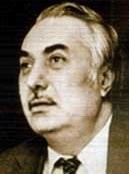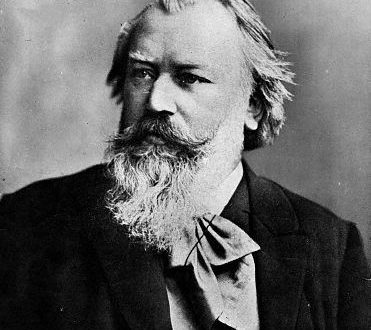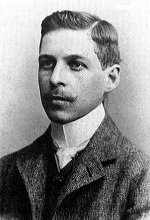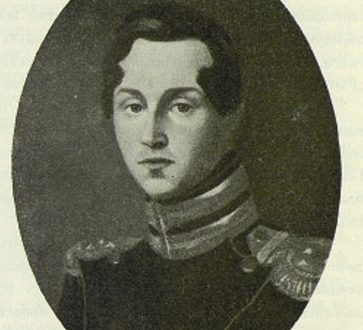
Otar Vasilyevich Taktakishvili |
Otar Taktakishvili

The might of the mountains, the rapid movement of the rivers, the flowering of the beautiful nature of Georgia and the centuries-old wisdom of its people – all this was lovingly embodied in his work by the outstanding Georgian composer O. Taktakishvili. Based on the traditions of the Georgian and Russian musical classics (in particular, on the work of the founder of the national school of composer Z. Paliashvili), Taktakishvili created many works that were included in the golden fund of Soviet multinational culture.
Taktakishvili grew up in a musical family. Educated at the Tbilisi Conservatory in the class of Professor S. Barkhudaryan. It was during the conservatory years that the young musician’s talent took off rapidly, whose name had already become famous throughout Georgia. The young composer wrote a song, which was recognized as the best at the republican competition and approved as the National Anthem of the Georgian SSR. After graduate school (1947-50), ties with the conservatory were not interrupted. Since 1952, Taktakishvili has been teaching polyphony and instrumentation there, in 1962-65. – he is the rector, and since 1966 – professor in the class of composition.
The works created during the years of study and up to the mid-50s reflected the young author’s fruitful assimilation of classical romantic traditions. 2 symphonies, the First Piano Concerto, the symphonic poem “Mtsyri” – these are the works in which the imagery and some means of expression characteristic of the music of the romantics and corresponding to the romantic age of their author were reflected to the greatest extent.
Since the mid 50s. Taktakishvili is actively working in the field of chamber vocal music. The vocal cycles of those years became the musician’s creative laboratory: in them he searched for his vocal intonation, his own style, which became the basis of his opera and oratorio compositions. Many romances on verses by Georgian poets V. Pshavela, I. Abashidze, S. Chikovani, G. Tabidze were later included in major vocal and symphonic works by Taktakishvili.
The opera “Mindiya” (1960), written based on the poetry of V. Pshavela, became a milestone in the composer’s creative path. Since that time, in the work of Taktakishvili, a turn is planned to major genres – operas and oratorios, and in the field of instrumental music – to concerts. It was in these genres that the strongest and most original features of the composer’s creative talent were revealed. Opera “Mindiya”, which is based on the story of a young man Mindni, gifted with the ability to understand the voices of nature, fully showed all the qualities of Taktakishvili the playwright: the ability to create vivid musical images, show their psychological development, and build complex mass scenes. “Mindiya” was successfully staged in a number of opera houses in our country and abroad.
The next 2 operas by Taktakishvili – the triptych “Three Lives” (1967), created on the basis of the works of M. Javakhishvili and G. Tabidze, and “The Abduction of the Moon” (1976) based on the novel by K. Gamsakhurdia – tell about the life of the Georgian people in the pre-revolutionary period and in first revolutionary days. In the 70s. 2 comic operas were also created, revealing a new facet of Taktakishvili’s talent – lyricism and good-natured humor. These are “The Boyfriend” based on the short story by M. Javakhishvili and “Eccentrics” (“First Love”) based on the story of R. Gabriadze.
Native nature and folk art, images of Georgian history and literature are the themes of Taktakishvili’s major vocal and symphonic works – oratorios and cantatas. Taktakishvili’s two best oratorios, “Following Rustaveli’s Footsteps” and “Nikoloz Baratashvili”, have much in common with each other. In them, the composer reflects on the fate of the poets, their vocation. At the heart of the oratorio In the footsteps of “Rustaveli” (1963) is a cycle of poems by I. Abashidze. The subtitle of the work “Solemn Chants” defines the main type of musical images – this is chanting, praise to the legendary poet of Georgia and a story about his tragic fate. The oratorio Nikoloz Baratashvili (1970), dedicated to the Georgian romantic poet of the XNUMXth century, includes the motives of disappointment, passionate lyrical monologues, and a rush to freedom. The folklore tradition is freshly and brightly refracted in Taktakishvili’s vocal-symphonic triptych – “Gurian Songs”, “Mingrelian Songs”, “Georgian secular hymns”. In these compositions, the original layers of ancient Georgian musical folklore are widely used. In recent years, the composer wrote the oratorio “With the lyre of Tsereteli”, the choral cycle “Kartala tunes”.
Taktakishvili wrote a lot of instrumental music. He is the author of four concertos for piano, two for violin, one for cello. Chamber music (Quartet, Piano Quintet, Piano Trio), and music for cinema and theater (Oedipus Rex at the S. Rustaveli Theater in Tbilisi, Antigone at the I. Franko Theater in Kyiv, “Winter’s Tale” in the Moscow Art Theater).
Taktakishvili often acted as a conductor of his own works (many of his premieres were performed by the author), as the author of articles touching on serious problems of composer creativity, the relationship between folk and professional art, and musical education. Long work as the Minister of Culture of the Georgian SSR, active work in the Union of Composers of the USSR and Georgia, representation on the jury of all-Union and international competitions – all these are the facets of the public activity of the composer Otar Taktakishvili, which he dedicated to people, believing that “there is no more honorable task for an artist than to live and create for the people, in the name of the people.
V. Cenova





